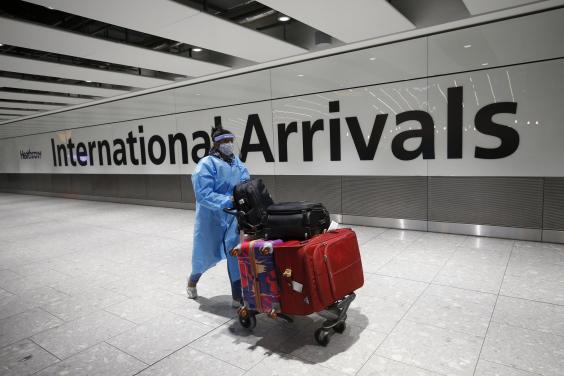Why has Ryanair started cancelling flights to Dublin?
Simon Calder answers your questions on flying to Ireland, self-contained accommodation, international arrivals during Covid and trips to Africa


Q Ryanair appears to have begun a mass cancellation of flights from Luton and Gatwick to Dublin until 16 May. There’s been no public announcement on this to date. Worth investigating?
Pat70
A Throughout the coronavirus pandemic, Ryanair has been fulfilling an unusual role: running what is effectively a subsidised public transport operation connecting Ireland with a range of UK airports, as well as a skeleton network into Europe. What's in it for the airline? Ryanair gets to keep at least some of its planes, pilots and cabin crew flying meaningfully, and I hope earns some goodwill.
Last summer, when the first lockdown was lifting, I flew frequently on Ryanair between the UK and the island of Ireland paid between £10 and £30 for each flight. The typical plane had about 30 people on board – about one-sixth full. Europe’s biggest budget airline was making a substantial loss with each departure.
For the past year, every airline has been posting schedules and putting flights on sale, which have subsequently been withdrawn. Ryanair has, in my experience, cancelled fewer than most. But there are limits. With severe restrictions on arrivals to Ireland and England’s rule of no international travel until 17 May at the earliest, I imagine bookings and loads are dismal.
The evidence is that the airline cannot fill a single daily departure between Stansted (its biggest base) and Dublin (its home); a flight for tomorrow morning is just £58, compared with £100 or more that I would expect to pay for an imminent departure. And returning from the Irish capital in the coming month, the fare on almost every day is £10.
Offering passengers in the core market between London and Dublin a choice of departure points is an indulgence – and one that looks too expensive while politicians in both cities show no sign of imminently easing restrictions between the two.

Q Does an apartment in an apartment block count as self-contained accommodation from 12 April? We want to travel as a household bubble to Liverpool to see my husband’s family. We had booked a Staycity apartment but they have cancelled, saying they are only open for business travel.
I want to book somewhere else but want to check if there’s any guidance on what constitutes self-contained?
Emily F
A From Monday, overnight stays away from home in England for non-essential purposes will be permitted for the first time in 14 weeks. What the government calls “self-contained accommodation” can reopen – so long as each property is used by members of the same household (which for this purpose includes another person in your “bubble”).
The definition of self-contained accommodation is: “Those that do not require shared use of bathing, entry/exit, catering or sleeping facilities.” Your Staycity apartment ticks all the boxes – apart from “entry/exit”. The company, which offers “aparthotels” across Europe, cannot offer sole use entrances – it’s a bit too “hotel” for that.
Staycity says: “Due to current government restrictions, we will remain open to accommodate only guests who need to stay for work purposes or other reasons specified in the government guidelines. We look forward to welcoming all our leisure guests back again from 17 May 2021.” That is the date on which hotels are allowed to open.
I have heard from other disappointed travellers who have been told that their bookings have been cancelled because of the “entry/exit” stipulation. As one put it: “It seems ridiculous that I can go to the supermarket and mix with loads of people but I can’t walk the short distance between the entrance and my apartment.”
Unsurprisingly, owners of self-contained properties are hoping to meet the rising demand during the five weeks in which hotels are off-limits. A quick look at Airbnb for the first weekend of unlocking indicates properties sleeping four are typically selling at £150 per night.

Q Why is it that planes are flying into the UK from all over, yet we are not allowed to travel outside of the UK in case we bring new variants back?
“Shazza,” via Twitter
A As you say, it is currently illegal to go abroad except for essential purposes. It will remain so until 17 May at the earliest. Yet on a typical day between 15,000 and 20,000 people arrive in the UK from abroad. A significant proportion of them, perhaps 5,000, are hauliers who use ferries and Eurotunnel to take their trucks between the UK and the rest of Europe. But the vast majority of the rest fly in, with Heathrow and Manchester the key inbound airports.
So who are these people? Some are on business (and therefore able to claim the “work” exemption), while others are owners of property abroad – for whom again there are exemptions. And a fair few are people who have dual nationality or something similar – eg residential status in the UK while holding a foreign passport. Some members of this latter category have been able to move fairly freely throughout the coronavirus pandemic, claiming that they are returning to their home country when exiting the UK and later returning to their homes here. There are also people who live abroad but who have family in the UK who are, with suitable documentation, perfectly able to arrive. So that is why it is still (just) worthwhile airlines operating a small number of flights.
The purpose of the “no non-essential foreign travel” law – which comes with a £5,000 fixed penalty attached – is to avoid adding to these numbers. The government brought in the most draconian travel restrictions ever in peacetime because of the fears you mention: that returning British travellers could import “variants of concern”.
Which begs the question: if that is a significant risk, why not ban all arrivals? No country has done that, because it is simply impractical. The UK is dependent on daily imports from Continental Europe, so keeping hauliers out is not an option. And nations cannot exclude their own citizens. Even Australia, which has had among the highest barriers (and has imposed a “do not leave” rule for over a year), has allowed a trickle of citizens to return.
But by banning outbound holidays – and visits to family and friends – the UK has sharply reduced the numbers arriving.

Q Do you think British travellers will be thinking about visiting Africa beyond 17 May?
Mark K
A That is a very timely question. For more than a year the government has warned against travel to almost anywhere in Africa, apart from a brief window of opportunity to visit Rwanda and in Namibia a few months ago. Since Monday’s government briefing which touched on travel, there has been much discussion of the new “green list” – which will allow light touch travel to some specified countries, possibly from 17 May. But it is not at all clear whether any African countries will make it to the list. At the moment the trend is going very much in the wrong direction. The number of nations in Africa on the “red list” increases to 16 from Friday 9 April with the addition of Kenya.
It joins Angola, Botswana, Burundi, Democratic Congo, Eswatini, Lesotho, Malawi, Mozambique, Namibia, Rwanda, Somalia, South Africa, Tanzania, Zambia and Zimbabwe. The government says it is particularly concerned about the South African variant of Covid-19, and the effect that importation could have on derailing the UK’s vaccination programme. While north and west African countries are not directly affected (yet), the popular African holiday destinations from Egypt via Tunisia and Morocco to Gambia have been languishing on the Foreign Office no-go list since 17 March 2020. The effect of this is to invalidate standard insurance policies.
When discussing possible green list countries, Africa has simply not figured. A reminder that to be on the green list, the UK government says a nation will need to have a competent vaccination programme with a significant proportion of the public jabbed and a high take-up rate; infection rates low or at least steadily and sustainably declining; and an insignificant prevalence of variants of concern.
Many African countries may find it tough to demonstrate that they meet this condition – and lack the diplomatic punch of, say, France, which has stayed off the red list despite soaring case numbers. I fear it is a case of African governments and travel specialists having to continue lobbying to allow travel to resume, with any significant change possibly waiting until rates in the UK are vanishingly low. It is an awful time for Africa.
Email your questions to s@hols.tv or tweet @simoncalder


Join our commenting forum
Join thought-provoking conversations, follow other Independent readers and see their replies
Comments